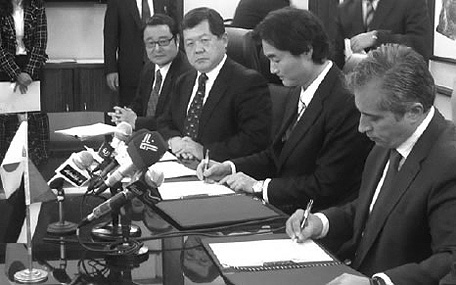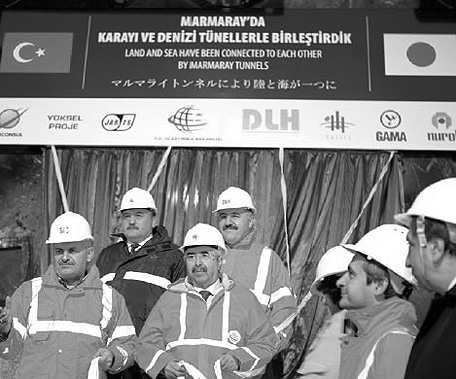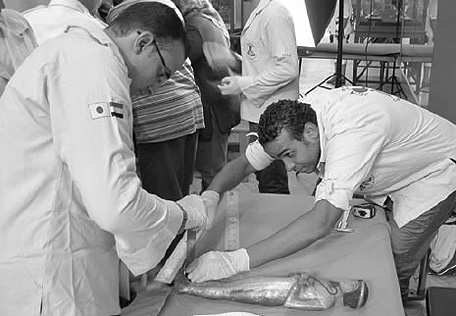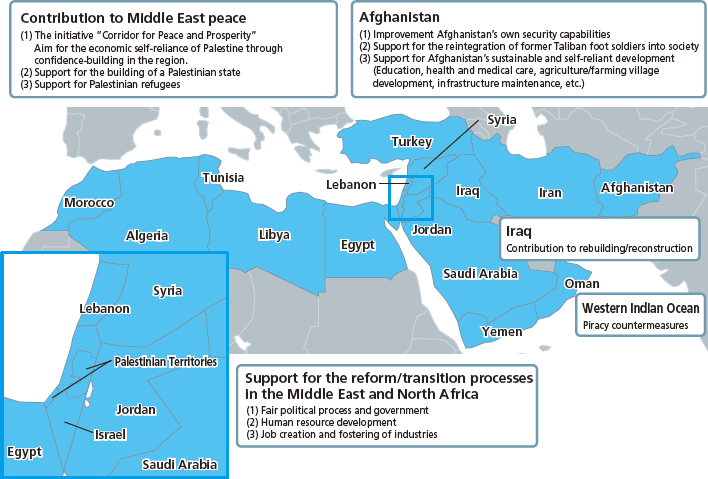Japan's Official Development Assistance White Paper 2011
5. Middle East and North Africa
The Middle East is a major energy supplying region which accounts for about 60% of the world's oil deposits and about 40% of its natural gas deposits. It is also a major artery for transport such as ocean shipping that connects Asia and Europe. The stability of the Middle East is extremely important to the global economy. Japan depends on the Middle East for about 90% of its crude oil imports, and the core sea trading routes linking Japan and Europe pass through the region, so the Middle East is an exceptionally critical region for the security of Japan's economy and energy as well.

Parliamentary Vice-Minister for Foreign Affairs Hisashi Tokunaga with Jordan's Minister of Planning and International Cooperation Jafar Hassan at the signing ceremony for the "Project for Rehabilitation and Improvement of Water Facilities in Tafieleh Governorate" grant aid project in Jordan
<Japan's Efforts>
In the Middle East there are countries and regions with devastated living and social infrastructure and security problems including Palestinian problem, Afghanistan and Iraq. These factors not only impoverish the economy and society in those countries and regions, but could also negatively impact the peace and security of the Middle East and the international community as a whole. The international community's concerted support is vital to the achievement of sustainable peace and stability in these countries and regions, as well as their nation-building and national reconstruction. Because of this position of the Middle East, there is significant meaning in Japan's proactive support.
Since December 2010, there have been frequent extensive demonstrations by citizens in the Middle East and North Africa, beginning in Tunisia. In particular, Tunisian and Egyptian regimes were ousted by demonstrators, and this led the political process to support the democratic transition, launching a truly historic period of reform in the region. However, a variety of reforms and transitions to new systems have only just begun in these countries of the Middle East and North Africa. The governments must not only move toward "democratic political systems," but must also overcome many socio-economic problems (high unemployment, rising food prices, widening gap between the rich and the poor, etc.), which pushes the countries in the region are facing an extremely significant period. Achieving such reforms and transition to new systems in a stable manner is also vital to the establishment of peace and stability in these regions. This will require a higher degree of assistance from the international community as well. At the G8 Deauville Summit, France held in May 2011, the G8 leaders called the historic changes taking place in the Middle East and North Africa the "Arab Spring," welcoming these changes and affirming the G8’s collective support for the efforts.
Economic circumstances in the Middle East vary, from high-income oil-producing nations to low-income Least Developed Countries and countries that are in a period of reconstruction following conflict. Japan believes that achievement of peace and stability in Afghanistan and Iraq, and achievement of Middle East peace, are issues related to the peace and security of the overall international community, and have deep significance from the standpoint of human security and peace-building, both of which are listed among basic principles in the ODA Charter. Japan therefore provides active assistance, working together with the international community. For oil-producing countries, by promoting the diversification of industry as well as continued economic growth, Japan cooperates in the countries' efforts to build stable economic foundation while moving away from oil dependent economies. For low and middle-income countries that lack oil and other natural resources, Japan will continue to provide assistance to reduce poverty and achieve sustainable economic growth. In particular, at the G8 Deauville Summit, responding to the changes taking place in the regions in working with the international community, and building on its past experiences in contributing to the growth and stability of Asia, Japan announced its policy to support Middle Eastern and North African countries' own self-help efforts for stable transition and various domestic reforms by working in close partnership with its private sector, as well as with relevant government-affiliated agencies. The policy is based on the following measures (i) supporting fair political process and government, (ii) human resource development, (iii) job creation and fostering of industries, (iv) advancing economic relationships and (v) mutual understanding. From this standpoint, at the meeting of the UN General Assembly in September 2011, Prime Minister Noda announced that, to improve the employment situation and support human resource development in the region, Japan would extend an additional ODA loan worth approximately $1 billion in total, for projects which were expected to contribute to infrastructure building and industrial development.
Further, the management of valuable water resources, which impacts the stability of the region, is an important challenge shared by the countries of the Middle East that. Japan, giving appropriate consideration to the areas of assistance and target priorities in each country, supports proactively building the environment to facilitate socio-economic stability in the region, and to achieve Middle East peace. The points of focus are as follows.
(1) Peace-building (Iraq, Afghanistan, Palestine)
(2) Middle East peace process (assistance to the Palestinians, aid to the surrounding Arab countries, etc.)
(3) Fair political process and government (including electoral assistance in Egypt and Tunisia, addressing disparity and enhancing stability by implementing aid projects in such areas as rural development, poverty reduction, water resources development, disaster prevention, and counter-terrorism and security)
(4) Human resource development, socio-economic infrastructure development for job creation, and fostering of industries
(See page 96 onwards for details regarding Afghanistan, Iraq, and Palestinian issue.)
[Turkey]
"Bosphorus Rail Tube Crossing Project"
Loan Aid (September 1999 - Current)
Located on the boundary between Asia and Europe, the city of Istanbul is a crossroads for the civilizations of the East and West as the center of commercial trade in Turkey. By the Bosphorus Straits as boundary, the city is separated into the commercial district on the European side of Istanbul and the residential district on the Asian side. During commuting hours, the two bridges over the Bosphorus Straits suffer chronic traffic congestion. There has been great expectation that a railway across Bosphorus Straits would alleviate the terrible traffic jams. Accordingly, Japan has provided ODA loan for the construction of a subway line to cross the Straits (total length 13.6 km, with 1.4 km over the Straits). This will make it possible for one million people to commute. Like Japan, Turkey experiences frequent earthquakes. Japan’s advanced quake resistance technology is used, among others, for an undersea tunnel with an enhanced design that can withstand earthquakes up to the magnitude of 7.5. Since the Turkish State Railways is planned to be linked with the subway line, it is likely to play a significant role as a major railway linking Asia and Europe in the future.

Construction staff members celebrate the connection of the undersea tunnel that crosses the Bosphorus Straits (maximum depth: approximately 60 m below sea level) with the tunnel that was dug from ground level (Asian side) (Photo: JICA)
[Egypt]
"Project for the Conservation Centre in the Grand Egyptian Museum"
Paid Technical Assistance Project related to ODA Loan (June 2008 - Current)
Tourism has a major role to play in stimulating the economy in Egypt, and cultural heritages are particularly important tourism resources. The objective of this project is to develop the human resources required to restore and manage 100,000 artifacts that will be displayed in the Grand Egyptian Museum planned for construction in the future. (In May 2006, Japan decided to provide ODA loans to assist for the construction.) Since 2008, Japan has conducted many types of training for local staffs of the Conservation Center that will be part of the museum. The themes of training include conservation of paper, dyed textiles, and metal, and the packaging and transfer of artifacts.
The appropriate storage of valuable artifacts such as papyrus requires learning world-class preservation technology and improving the display environment. Although Egyptian technicians have the basic capacities, they still have insufficient knowledge and experience with the latest technology and management methods, and the capacity development of young technicians is also a challenge. Japanese experts with advanced technology provide practical training in related areas.

Confirming artifacts related to Tutankhamen (Photo: JICA)
Japan's international cooperation policy in the Middle East and North Africa Region


